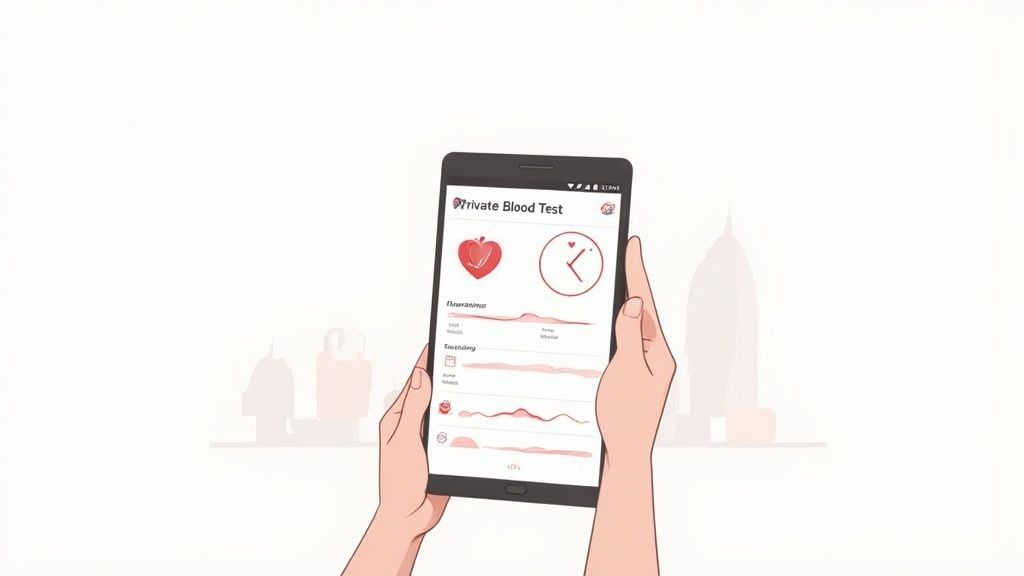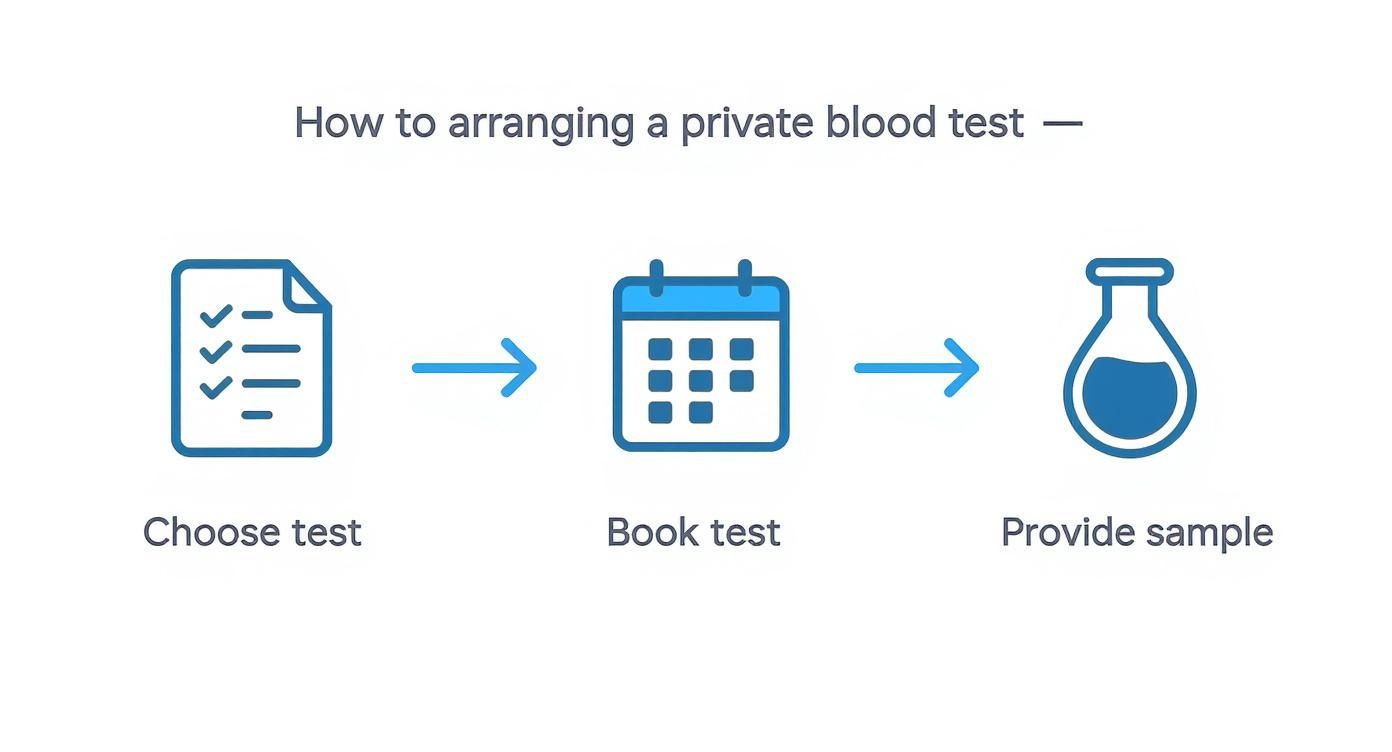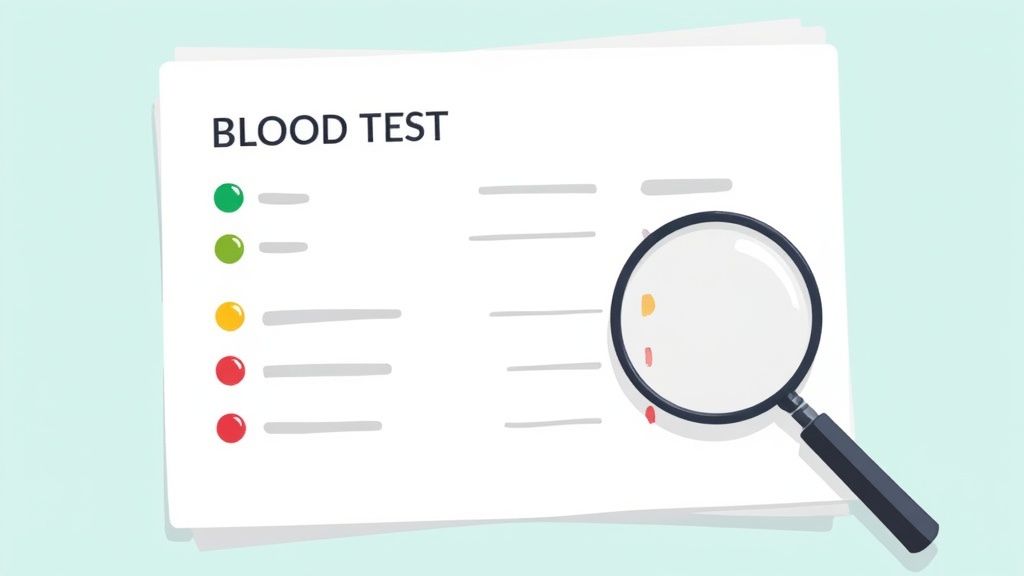.webp)
Private blood tests are health checks you can order for yourself, completely bypassing the traditional NHS route. Think of them as a health MOT for your body—a way to check what's happening under the bonnet before any warning lights appear, giving you more speed, convenience, and choice in managing your wellness.

Imagine wanting to understand your body better—maybe checking your vitamin D levels after a long winter or keeping tabs on your cholesterol. In the past, this meant booking a GP appointment, explaining your concerns, and hoping the test was deemed medically necessary.
Private blood tests flip that dynamic on its head, putting you firmly in the driver's seat.
These services let you pick from a huge menu of tests, pay for them directly, and get the results sent straight to you, often in just a few days. This proactive approach is a huge reason for their explosion in popularity. Instead of waiting for symptoms to show up, more and more people are using these tests to monitor their health, spot potential issues early, and make genuinely informed lifestyle choices.
The demand for accessible health information is undeniable. People are no longer content to be passive recipients of healthcare; they want to be active participants.
This shift is reflected in the market's serious growth. The UK private blood test market was valued at around $500 million in 2025 and is set to grow significantly, all driven by a desire for preventative health insights without the long waiting times often linked with public services.
It's about more than just convenience; it's about empowerment. Having direct access to your own health data gives you a much deeper understanding of your body. If you're interested in this model, you can learn more about what private healthcare entails in our comprehensive guide.
Private blood tests essentially bridge the gap between curiosity and clarity. They provide the data you need to have more meaningful conversations with healthcare professionals and take ownership of your long-term wellness strategy.
To really get the appeal, it helps to see a direct comparison. While the NHS provides a vital service for medically necessary testing, private options cater to a different set of needs, focusing on speed, choice, and proactive screening.
Here’s a quick breakdown of the key differences:
FeaturePrivate Blood TestsNHS Blood TestsAccessSelf-referred; book directly online or in-clinic.Requires a GP referral based on symptoms or medical need.SpeedResults are often available in 1-3 working days.Can take several days to weeks for results and GP review.ChoiceExtensive menu of tests, including specialised wellness panels.Limited to tests deemed clinically necessary by a GP.CostPaid for directly by the individual.Free at the point of service, funded by taxation.
As you can see, the choice isn't about one being "better" than the other. They simply serve different purposes. The NHS is there for when you're unwell and need a diagnosis, whereas private tests are for when you want to take proactive control of your health on your own terms.

The growing interest in private blood tests isn't just a fleeting trend. It points to a real shift in how we’re thinking about our health—moving from a reactive "wait-and-see" approach to one where we're firmly in the driver's seat. People are actively looking for tools to understand their own bodies, and private testing is a perfect fit.
The advantages are clear and compelling. We’re talking about incredible speed and convenience, the power that comes from having your own data, a huge choice of specialised tests, and the ability to keep a close eye on your health over time. Together, they create a powerful new way to manage your personal wellbeing.
Let's be honest, one of the biggest frustrations with traditional healthcare routes can be the waiting. Waiting for a GP appointment, then waiting again for results, can turn a small health worry into a major source of anxiety.
Private services completely sidestep these delays. Instead of navigating referrals and clinic schedules, you can often book a test for the same day or the next. That speed carries through to the results, which usually land directly in your inbox within a few days.
For many people, this efficiency is a game-changer. A concern that might have caused weeks of stress can be investigated and understood in a fraction of the time, giving you either peace of mind or a clear path forward, fast.
For a long time, health data was something that was done to us, not with us. It was held and interpreted by professionals, leaving us as passive recipients of information. Private testing flips that model on its head by putting your own health metrics directly in your hands.
This direct access is incredibly empowering. When you can see your vitamin D levels, track your cholesterol, or monitor your thyroid function for yourself, you're no longer just a patient; you're an active partner in your own health journey. It turns vague health advice into solid, personal data you can actually use.
You start to see the real-world impact of your choices. You can connect the dots between a change in diet and your lipid profile, or see how a new fitness routine is affecting your inflammation markers. That feedback loop is a huge motivator for making positive, lasting changes.
Another massive advantage is the sheer range of tests available. While the NHS provides essential diagnostic testing for clear medical needs, its focus is rightly on clinical necessity. Private labs, on the other hand, offer a much wider menu of tests geared towards wellness, performance, and deep-dive health screening.
For example, private blood tests in the UK often deliver results within 1–3 days, a world away from potentially much longer waits through other channels. This speed, combined with a wider array of options—like detailed hormone panels, advanced nutritional profiles, or specific athletic performance markers—gives you access to insights you might otherwise never uncover.
Perhaps the most profound benefit is the ability to move from a reactive to a proactive health strategy. Instead of waiting for symptoms to tell you something is wrong, regular private testing lets you keep an eye on your body’s inner workings over time. This is the very essence of preventive healthcare, a topic we explore more in our article on blood testing as an unsung hero of preventive healthcare.
By establishing a personal baseline for your key biomarkers, you can spot subtle shifts long before they become big problems. Is your blood sugar slowly creeping upwards? Are your iron stores gradually dipping? Catching these trends early opens up a crucial window to intervene, often with simple lifestyle adjustments, and stop a minor imbalance from becoming a major issue.
Looking at the broader picture, this kind of proactive diagnostic access is a key part of modern healthcare. It's worth exploring the wider benefits of international private medical insurance, which often covers proactive diagnostic tests like these as part of a comprehensive health plan.
Taking the plunge into private blood tests can feel a little daunting at first, but it’s actually far more straightforward than you might think. We can break it down into a few simple stages to take you from curiosity to clarity, giving you a clear roadmap to understanding your health.
It all starts with figuring out what you want to learn about your body. From there, you just need to pick the right service, provide a sample, and wait for your results. Every part of the process is designed to be as simple and user-friendly as possible.
First things first: what do you want to measure? Private testing companies offer a huge menu of options, so the best way to start is by pinpointing your specific health questions. Are you feeling constantly drained and wondering about your iron or vitamin B12 levels? Or maybe you're concentrating on heart health and want to see a detailed cholesterol panel.
Here are a few common starting points to consider:
Don’t feel overwhelmed by the choices. Most provider websites group their tests by health goals, which makes it much easier to find a panel that fits what you’re looking for.
Once you’ve picked your test, the next step is to arrange how to provide your sample. Most modern private healthcare providers have flexible options designed to fit around a busy schedule. For instance, when you look at how to book appointments online at The Vesey, you’ll find the process is quick and simple.
You’ll usually come across three main ways to get your sample collected:
The collection itself is quick and simple. If you’re visiting a clinic or have a nurse coming to you, a professional will handle everything. They’ll use a sterile needle to draw blood from a vein, and the whole thing is usually over in a few minutes.
If you’ve gone for a finger-prick test, the kit will arrive with clear, step-by-step instructions. It will contain a lancet to prick your finger and a small vial to collect the blood droplets. It’s really important to follow the instructions carefully to make sure you provide a good enough sample for the laboratory to analyse properly.
Key Takeaway: No matter which method you choose, the goal is the same: to collect a clean, high-quality blood sample that can be sent securely to a UKAS-accredited laboratory for analysis—the very same standard of facility trusted by the NHS.
Diving into the world of private blood tests can feel a bit like standing in front of a massive catalogue. With so many options, the trick is to match the test to your personal health goals, not get bogged down in the science.
Rather than just a technical list, it’s far more helpful to group these tests into practical categories. This way, you can find exactly what you need, whether you’re after a general health overview or want to investigate something specific.
Think of a general wellness panel as a comprehensive "MOT" for your body. It’s the most popular place to start for anyone new to private blood testing because it gives you a broad snapshot of your overall health.
These panels measure a wide range of biomarkers, giving you a solid baseline understanding of what’s happening under the surface. It's a brilliant way to proactively screen for common issues and establish your personal health benchmarks for future reference.
A general wellness test usually covers:
Feeling constantly tired or just a bit "off"? Your nutritional status could be the culprit. These private blood tests zero in on specific vitamins and minerals that are vital for energy, mood, and immune function.
Deficiencies in key nutrients are incredibly common in the UK, especially during the darker winter months. A simple test can provide clear answers and a direct path to feeling better, often through straightforward dietary changes or supplements.
Popular nutritional tests check for:
This simple infographic below shows just how straightforward the process of arranging a private blood test is.

As you can see, the journey from deciding on a test to giving your sample is designed to be clear and manageable.
Hormones are powerful chemical messengers that influence everything from your mood and metabolism to your reproductive health. When they’re out of balance, the effects can be significant and wide-ranging.
Hormone tests are available for both men and women, offering insights into fertility, energy levels, stress, and the changes that come with ageing.
For women, these tests might measure oestrogen, progesterone, and follicular-stimulating hormone (FSH) to investigate menstrual cycle irregularities or symptoms of menopause. For men, a testosterone test can shed light on issues like low energy, reduced libido, and mood changes. A comprehensive blood testing service will offer a wide array of these specialised panels.
Beyond general wellness, you can choose private blood tests that target very specific areas of your health. These are ideal if you have a family history of a certain condition or want to monitor a particular biomarker closely.
These targeted panels allow you to take a focused approach, investigating precise aspects of your health without the need for a broad, all-encompassing test. It’s about getting the exact data you need, when you need it.
This category includes:
To help you visualise the options, here's a quick summary of some of the most popular test categories and who they're best suited for.
Test CategoryKey Biomarkers MeasuredIdeal ForGeneral WellnessFull Blood Count, Liver Function, Kidney Function, Cholesterol, HbA1cAnyone seeking a baseline health check or proactive screening.Nutritional HealthVitamin D, Vitamin B12, Iron/Ferritin, FolateIndividuals experiencing fatigue, low mood, or on specific diets.Hormone PanelsTestosterone (Men), Oestrogen, Progesterone, FSH (Women)People investigating issues with fertility, libido, mood, or menopause.Thyroid FunctionTSH, Free T4, Free T3, Thyroid AntibodiesThose with symptoms like unexplained weight change, fatigue, or hair loss.Cardiovascular HealthHDL, LDL, Triglycerides, hs-CRPIndividuals with a family history of heart disease or wanting to monitor risk factors.Sports PerformanceTestosterone, Cortisol, hs-CRP, Creatine KinaseAthletes and active individuals looking to optimise training and recovery.
This table provides a starting point, but remember that the best test for you will always depend on your unique health profile and goals.

The moment of truth arrives when your results land in your inbox. You’ll open a report, often delivered digitally, filled with medical terms, numbers, and maybe a few graphs. It can look a bit intimidating at first, but figuring out what it all means is much simpler than you think.
The good news is that these reports are designed to give you a clear, user-friendly summary of your health. They aren’t meant to be a complex medical puzzle. Most providers even use smart visual aids to make it obvious which areas might need your attention.
The first concept you’ll need to get your head around is the reference range. Every biomarker measured—whether it’s cholesterol, vitamin D, or a liver enzyme—has a ‘normal’ or optimal range. Think of it as the safe zone on a car's temperature gauge.
Your personal result for each marker is shown right next to this range, giving you an instant comparison of where you stand. If your number falls within the reference range, it’s generally considered normal. If it’s outside, it will be flagged as either high or low.
It’s crucial to remember, however, that these ranges are based on population averages. They aren’t absolute rules set in stone for every single person. Things like your age, gender, and even the time of day your sample was taken can all influence what’s ‘normal’ for you.
A result outside the reference range is an important signal, not an automatic diagnosis. It’s a prompt to look closer and have a conversation with a healthcare professional, not a reason to panic.
Many private blood test reports use a simple traffic light system to help you spot what’s important straight away. This visual cue is incredibly useful for cutting through the noise and focusing on what matters.
Here’s how it usually works:
Alongside these colour codes, most reports from reputable providers will include comments from a qualified doctor. This commentary puts the numbers into context, explaining what a high or low result for a specific biomarker might mean and suggesting what to do next.
This is the most important takeaway: your private blood test results are a powerful piece of information, but they are just one part of your overall health picture. They are a starting point for a more informed conversation, not a final, definitive diagnosis.
Your GP or a private doctor is the best person to interpret these results in full. They can analyse the data in the context of your personal medical history, lifestyle, and any symptoms you’re experiencing. They will connect the dots to see the bigger picture, helping you understand what the results truly mean for you.
Ultimately, the goal of a private blood test is to arm you with data. Use this information to ask smarter questions, make better-informed lifestyle choices, and work collaboratively with healthcare professionals to proactively look after your long-term wellbeing.
It's completely normal. Even after you see the benefits and understand the process, a few practical questions often pop up. Investing in your health is a big step, and you want to be sure you have all the facts straight.
Let's clear up some of the most common queries we hear. Our goal is to give you the confidence to move forward, fully informed and ready to take control.
This is the big one, and the answer is a firm yes. Reputable private healthcare providers in the UK use the very same UKAS-accredited laboratories that the NHS relies on for its own testing.
This accreditation isn't just a badge; it's a guarantee of quality. It means the lab meets the highest possible standards for accuracy, precision, and reliability. So, when you choose a provider, just check they're working with a certified lab. It’s your assurance that the results are as trustworthy as they come.
While you don't have to, we highly recommend it. Your GP holds the master copy of your medical history, and sharing your results adds the latest, most detailed chapter. It gives them a complete, up-to-date picture of your health.
This is especially important if any of your results fall outside the normal range. Your GP can put those numbers into context, advise on what to do next, and update your medical records. Think of it as teamwork—you’re giving your doctor the best possible information to ensure your care is seamless.
The main differences really come down to convenience versus comprehensiveness.
A finger-prick test is the do-it-yourself option. You use a small lancet to collect a tiny blood sample from your fingertip at home. It’s brilliant for its ease and is perfect for monitoring many common biomarkers without leaving the house.
A venous draw, on the other hand, is done by a healthcare professional, usually a phlebotomist or nurse, who takes a larger sample from a vein in your arm. This is the gold standard. Why? Because the larger, cleaner sample is required for a much wider range of tests and it removes any risk of collecting a sample that's too small or contaminated. You can see the different options available by checking a comprehensive private blood test price list.
The bottom line is this: while finger-prick tests are great for specific, simple checks, a venous draw provides a higher quality sample suitable for more extensive and complex analysis, offering you a deeper and more reliable insight into your health.

Book your private blood test at The Vesey
Private tests provide incredibly valuable data points. They are brilliant at flagging potential health issues or imbalances, but they aren't a substitute for a formal diagnosis from a doctor.
Think of the results as a crucial piece of the puzzle, but not the final picture. A qualified healthcare professional is needed to interpret those results alongside your symptoms, medical history, and other clinical findings to make an accurate diagnosis. In short, the test flags the issue; the doctor confirms it.
At The Vesey, we are committed to providing you with clear, accurate, and actionable health insights. Take control of your wellbeing today by exploring our range of private blood tests.
Book Your Private Blood Test Now
